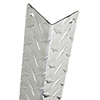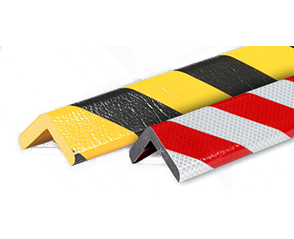Powder Coating
Click below for pertinent facts and informational links for the materials that our corner guards are made from.
From Wikipedia: https://en.wikipedia.org/wiki/Powder_coating
Powder coating is a type of coating that is applied as a free-flowing, dry powder. Unlike conventional liquid paint which is delivered via an evaporating solvent, powder coating is typically applied electrostatically and then cured under heat. The powder may be a thermoplastic or a thermoset polymer. It is usually used to create a hard finish that is tougher than conventional paint. Powder coating is mainly used for coating of metals, such as household appliances, aluminum extrusions, drum hardware, automobile, motorcycle, and bicycle parts. Newer technologies allow other materials, such as MDF (medium-density fibreboard), to be powder coated using different methods. The powder coating process was invented around 1945 by Daniel Gustin US Patent 2538562.
Is It Environmentally Friendly?
Powder coating is recognized as an environmentally friendly process because it doesn't rely on solvents or chemical carriers like traditional wet-paint systems. Because powder coating relies on the electrostatic charge to hold the paint to the work piece, powder coating eliminates VOC emission problems.
Is powder coating better than paint?
Powder coating provides better performance than wet paint—it is more resistant to chipping, scratching, and other wear because of the thermal bonding it undergoes during curing, and because it can be applied in much thicker layers. In addition to its physical toughness, powder coating provides superior color retention.
How Durable Is It?
Powder coatings are very resistant to cracking and peeling and provide very high abrasion, corrosion and chemical resistance. These attributes vary according to the specific application and paint choice. Powder coatings typically meet or exceed the finish performance characteristics of conventional solvent based wet paint coatings.
How Long Does Powder Coating Last?
Powder coating can maintain its finish up to 15-20 years, depending on pre-treatment and the type of powder. Its resistance to weather, corrosion, and chemicals makes powder coating a more durable finish than paint or other liquid coatings.
Will powder coating rust?
Powder coating is resistant to cracking, peeling, chipping, abrasion, rust and damage due to chemical exposure. While it isn't indestructible, it is highly durable, retains color and gloss, goes on uniformly, has excellent UV stability and is a far more environmentally friendly option than traditional liquid paint.
Is Powder Coating expensive?
Price - Powder coating tends to be slightly more expensive than painting. ... But powder coating is more expensive for large jobs. Difficult to repair - Powder coating is not easy to touch up. The surface will have to go through the heat curing process all over again.
What Colors Are Available?
PSP Powder Coating has access to over 200 paint colors and textures but can also special order custom paint blends to meet your project needs.
What Can Be Powder Coated?
Typically any metal object that can hold the electrostatic charge needed to affix the sprayed powder and can tolerate the high heat levels of the curing process. Mild steel, galvanized and electroplated steel, aluminum, stainless steel and most other steel alloys can be powder coated.
What Is Clear Powder Coating And Why Is It Important?
Clear powder coating is similar to clear coated wet paint. The clear powder coat protects the pigmented powder coating underneath and helps to add depth and sheen to the finished surface. We recommend a clear powder coating over any powder coated finish containing metal flakes. This helps to protect the base powder coat layer from the additional stress induced by the metal flakes and their reflective properties.
How long will my project take?
The actual powder coating and curing process typically takes from 1-3 hours depending on the size and complexity of your wall protection. Factoring in transportation we typically plan on an added 2-3 days to the manufacturing time. However, these products need to be scheduled and typical lead times are 2-3 weeks until shipment.












